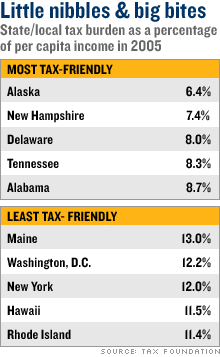Click table for full list »

|
|
| Tax friendly places, 2005
|
|
|
|
|
|
|
NEW YORK (CNNMoney.com) – In a close vote, the House on Thursday approved a $56 billion tax relief bill, the controversial centerpiece of which is a two-year extension through 2010 of reduced tax rates on capital gains and dividends.
The tax rates, of 15 percent or less, aren't scheduled to expire until 2008, at which point capital gains would revert to being taxed at 20 percent and dividends would be taxed at the investor's income tax rate.
But Republican lawmakers who favor making the extension now say that lower investment rates are important to economic growth.
The White House, which backs the measure, says the extension is needed now to give investors certainty in planning for the future.
An analysis by Federal Reserve economists, however, found that the lower investment tax rates, enacted in 2003, haven't had a significant effect on the value of the stock market and resulted in only "a muted gain" in corporate payouts to shareholders.
House approval for extending the lowered rates comes at a time when lawmakers also want to reduce the deficit and have proposed doing so in part by curbing spending increases for programs that target low-income Americans.
A two-year extension on the investment tax rates is estimated to cost $20.5 billion over five years.
Critics of the provision have argued that the investment tax break primarily benefits upper-income taxpayers. An analysis by the liberal group Citizens for Tax Justice found that the wealthiest 1 percent of Americans would directly benefit the most – receiving more than half the value of the tax cut. It also estimates that 78 percent of Americans would receive no direct benefit at all.
Apart from the investment tax break debate, some lawmakers in the House had objected to the absence in the bill of significant relief from the alternative minimum tax (AMT).
But yesterday the House passed a separate $31.5 billion bill providing relief from AMT for 17 million taxpayers who were likely to fall prey to the "wealth tax" next year. (For more on that bill, click here. And for a look at who is likely to be affected by the AMT, click here.)
Last month, the Senate passed its own version of a tax relief bill that did include AMT relief, but did not include an extension of the reduced tax rates on capital gains and dividends because Sen. Charles Grassley (R-Iowa) could not get enough support for it from members of the Finance Committee, which he chairs.
Now that both the House and Senate have passed their own tax bills, members of both bodies must negotiate which elements get into a final piece of legislation. It's still unclear whether the Senate will choose to pass its own AMT relief bill and take out the AMT provision in the larger tax package, freeing up about $30 billion that may be used for other elements, like the extension of the capital gains and dividend tax rate.
Other provisions in the House bill
The House bill includes a number of other tax-break extensions that would affect individual taxpayers and which are similar to those proposed in the Senate tax bill. Among them:
One-year extension of the state and local general sales tax deduction: The House bill would allow taxpayers to take this deduction in tax year 2006. Current law only allows it to be taken in tax years 2004 and 2005.
Taxpayers have the option on their federal return of deducting either what they paid in state and local income tax or what they paid in state and local sales taxes, whichever is higher.
This provision has been of greatest advantage to taxpayers who live in the handful of states that don't impose an income tax and to those who live in states with high sales taxes and relatively low income taxes.
This extension would reduce federal revenue by an estimated $2.1 billion over five years.
One-year extension of the college-tuition deduction: Currently this deduction, which can be taken even if you don't itemize deductions on your federal return, is in place for tax years 2002 through 2005. The House bill would extend it through 2006.
The deduction may be taken on a maximum of $4,000 in tuition and fees for taxpayers with adjusted gross income (AGI) of $65,000 or less ($130,000 for married couples) or $2,000 for taxpayers with AGIs of $80,000 or less ($160,000 for married couples).
The tuition deduction may not be taken for expenses for which you are claiming an education credit (e.g., the HOPE or lifetime learning credits). You must choose one or the other if you qualify for both.
Extending the tuition deduction would reduce federal revenue by an estimated $1.7 billion over five years.
Two-year extension of the savers credit: Through 2006, low-income taxpayers may receive a credit (a dollar-for-dollar reduction of the taxes they owe) for contributions they make up to $2,000 to qualified retirement savings plans such as 401(k)s, 403(b)s as well as traditional and Roth IRAs. The House bill would extend this provision through the end of 2008.
The credit is available only to those taxpayers with AGIs of $25,000 or less ($50,000 or less for married couples).
The move would reduce federal revenue by an estimated $2.8 billion over five years.
Tax-friendly places to live
Taxes: State by state
Big city tax rankings

|